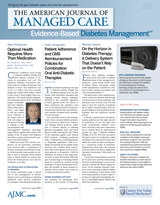- Center on Health Equity & Access
- Clinical
- Health Care Cost
- Health Care Delivery
- Insurance
- Policy
- Technology
- Value-Based Care
Join Us in Boston for Patient-Centered Diabetes Care 2015
Here at the Joslin Diabetes Center, we are committed to making the lives of those with diabetes better through world-class research, patient care, and education. We are engaged in activities across the spectrum of diabetes innovation, leveraging our strengths in clinical care, research, and education to address this global epidemic. We continue to export the models for care and education developed here in Boston to share them with others around the world.
Over our 116-year history, we have introduced new care models, from the role of the diabetes educator to team-based care to population health to new treatment for complications, such as the discovery of laser photocoagulation for diabetic retinopathy. It is this commitment to sharing what we know and to engaging others who can aid us in our mission of preventing and treating diabetes and its complications that makes us especially excited to join with The American Journal of Managed Care to present Patient-Centered Diabetes Care 2015. This year, the third that AJMC has presented the conference, it will be held April 16-17, 2015, at the Renaissance Boston Waterfront Hotel.
Past attendees of this meeting or Joslin’s Diabetes Innovations conference know why this partnership works so well. A shared goal of these meetings has been to convene stakeholders from across the healthcare spectrum: payers, policy makers, leaders in clinical care and research, diabetes educators, and, of course, patients and their advocates. Patient-Centered Diabetes Care 2015 will continue this tradition, as we will bring together esteemed faculty, both as presenters and participants in panel discussions. The topics will cover the diversity of issues that affect diabetes care. Over 2 days, we will share new findings in clinical research, gain insights into the behavioral issues that affect diabetes treatment, and learn about new technology that could transform care.
Bringing the conference to Boston has allowed us to tap the vast expertise of our faculty at Joslin, and more broadly, at Harvard’s programs in public health. We will also be joined by leading payers, educators, and patient advocates. I would like to highlight just a few of the participants who are coming to Boston:
Om P. Ganda, MD, is senior physician and medical director of the Lipid Clinic and chairman of the Clinical Oversight Committee at Joslin. Dr Ganda, who is an associate clinical professor of medicine at Harvard Medical School, will be speaking about new developments in lipid management.
Howard A. Wolpert, MD, is the director of the Joslin Institute for Technology Translation (JITT) and director of Insulin Pump and Continuous Glucose Monitoring programs. Dr Wolpert, who is an associate professor of medicine at Harvard Medical School, will share insights from his award-winning research on how technology can change the landscape of diabetes management.
Frank Hu, MD, MPH, PhD, is a professor of epidemiology and nutrition at the Harvard School of Public Health and is completing service as a member of the 2015 Dietary Guidelines Advisory Committee. Dr Hu, who is director of the epidemiology and genetics core of the Boston Obesity Nutrition Research Center, will discuss the impact of national nutrition policy.
Amy Tenderich, the founder and editor of DiabetesMine™, is one of the nation’s most important diabetes patient advocates. She returns to Patient-Centered Diabetes Care this year to discuss the role of social media in the treatment and education of persons with diabetes. Clinicians who are not using social media need to hear from Ms Tenderich and her fellow panelists.
Hope Warshaw, MMSc, RD, CDE, BCADM, is the owner of Hope Warshaw Associates, LLC, a diabetes and nutrition consultantcy, and an important force in the use of social media to educate persons with diabetes.
Edmund J. Pezalla, MD, MPH, vice president and national medical director, Pharmacy Policy and Strategy, Aetna Inc, and Todd Prewitt, MD, corporate chronic condition medical director for Humana, Inc, are among the representatives from national commercial payers who are taking part in panel discussions. They’ll contribute to discussions on the role of integrated delivery networks in promoting adherence and a debate on whether combination therapies are worth the cost.
Of course, this is just the beginning. For clinicians especially, Patient-Centered Diabetes Care 2015 will offer a unique opportunity to interact with key leaders across the healthcare continuum to share innovative approaches to improve the lives of those with diabetes. This meeting will also offer a chance for decision makers in the payer community, for leading patient advocates, and for those who influence healthcare policy to interchange ideas and address the opportunities and challenges of Patient Centered Diabetes Care. I encourage you to join us in Boston.
Dr Gabbay is chief medical officer and senior vice president at the Joslin Diabetes Center, Boston.

Quality of Life: The Pending Outcome in Idiopathic Pulmonary Fibrosis
February 6th 2026Because evidence gaps in idiopathic pulmonary fibrosis research hinder demonstration of antifibrotic therapies’ impact on patient quality of life (QOL), integrating validated health-related QOL measures into trials is urgently needed.
Read More
Exploring Pharmaceutical Innovations, Trust, and Access With CVS Health's CMO
July 11th 2024On this episode of Managed Care Cast, we're talking with the chief medical officer of CVS Health about recent pharmaceutical innovations, patient-provider relationships, and strategies to reduce drug costs.
Listen
Building Trust: Public Priorities for Health Care AI Labeling
January 27th 2026A Michigan-based deliberative study found strong public support for patient-informed artificial intelligence (AI) labeling in health care, emphasizing transparency, privacy, equity, and safety to build trust.
Read More

